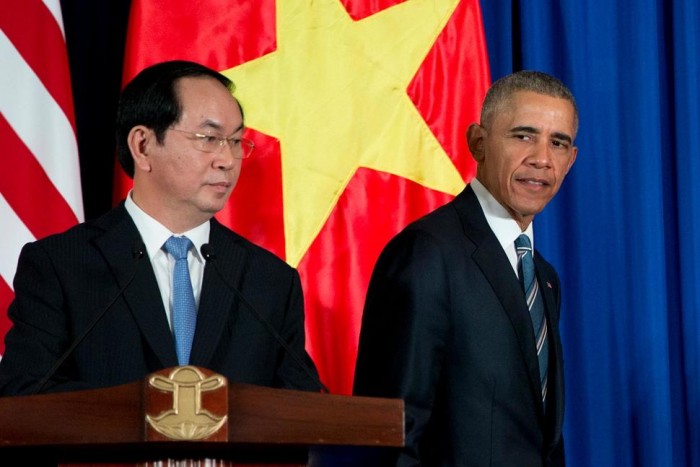Media Report

- The Washington Post reports: "China warned President Obama on Tuesday not to spark a fire in Asia after he announced the lifting of a long-standing embargo on lethal arms sales to Vietnam....The United States and Vietnam must not spark a 'regional tinderbox,' the Communist Party mouthpiece, China Daily, warned in an editorial Tuesday, noting concerns that Obama's move was meant to 'curb the rise of China.'...The nationalist Global Times tabloid called Obama's claim that the Vietnam move was not aimed at China 'a very poor lie,' adding that it would exacerbate the 'strategic antagonism between Washington and Beijing.'"
- The New York Times reports: "The United States is rescinding a decades-old ban on sales of lethal military equipment to Vietnam, President Obama announced at a news conference in Hanoi on Monday, ending one of the last legal vestiges of the Vietnam War. The United States has long made lifting the embargo contingent on Vietnam's improving its human rights record, and recently administration officials had hinted that the ban could be removed partly in response to China's buildup in the South China Sea. But Mr. Obama portrayed the decision as part of the long process of normalizing relations between the two countries after the Vietnam War."
- The Wall Street Journal reports: "Behind closed doors in March, some of China's most prominent economists and bankers bluntly asked the People's Bank of China to stop fighting the financial markets and let the value of the nation's currency fall....In August 2015, the PBOC said it would make the yuan's value more market-based, an important step in liberalizing the world's second-largest economy. In reality, though, the yuan's daily exchange rate is now back under tight government control....The flip-flop is a sign of policy makers' deepening wariness about how much money is fleeing China, a problem driven by its slowing economy. For now, at least, officials believe the benefits of freeing the yuan are outnumbered by the number of threats."
Calendar
- 2016-05-23 China plans base station for rescue operations in South China Sea
- 2016-05-22 US wields biggest stick in trade dumping fight
- 2016-05-20 Taiwan President Takes Cautious Line on China at Inauguration
- 2016-05-19 China, Denying Close Encounter With American Plane, Points Finger at U.S.
- 2016-05-18 China criticizes US steel anti-dumping measures
- 2016-05-17 Top ranked Chinese official to 'listen' to HK demands as independence calls grow
- 2016-05-16 China Housing Revival Buffers Economy
- 2016-05-15 Maoists Still a Force 50 Years After the Cultural Revolution
- 2016-05-13 Apple invests $1 billion in Chinese ride-hailing service Didi Chuxing
- 2016-05-12 EU lawmakers reject market economy status for China
News
- The New York Times Vietnam Arms Embargo to Be Fully Lifted, Obama Says in Hanoi
- The Washington Post Don't start a fire in Asia, China warns Obama after Vietnam arms embargo lifted
- The Wall Street Journal A Rare Look Inside China's Central Bank Shows Slackening Resolve to Revamp Yuan
- Bloomberg Business Wanda Billionaire Says Disney No Match for His 'Wolf Pack'
- BBC News China's Science Revolution
- The Wall Street Journal China's Middle Class Vents Over Growing List of Grievances
- BBC News China school milk: Social media users up in arms over 'hush-up'
- The New York Times In Sync: Over 31,000 in China Set World Dance Record
- The Wall Street Journal China's Brokerages: The Next Leverage Frontier
- The Washington Post Surprising ancient beer recipe revealed by Chinese pottery shards
- CNN Virginia Gov. Terry McAuliffe under federal investigation for campaign contributions
- Bloomberg Business 'Massive Bailout' Needed in China, Banking Analyst Chu Says
- The Guardian No country for academics: Chinese crackdown forces intellectuals abroad
Commentary
- Brookings Institute Tsai's inauguration in Taiwan: It could have been worse
- The Wall Street Journal: China Real Time 5 Things to Know About China's Yuan Policy
- The Diplomat Why Does China Want to Control the South China Sea?
- The New York Times: Sinosphere Q. and A.: Carl Minzner on the Shift to Personalized Rule in China
- The National Interest China's March Towards Military Dominance in the South China Sea
- Quartz China's internet propaganda is more subtle and sophisticated than it ever has been
- The Wall Street Journal: China Real Time Cold Feet: China's Experiment With Freer Yuan Again Gets Cut Short